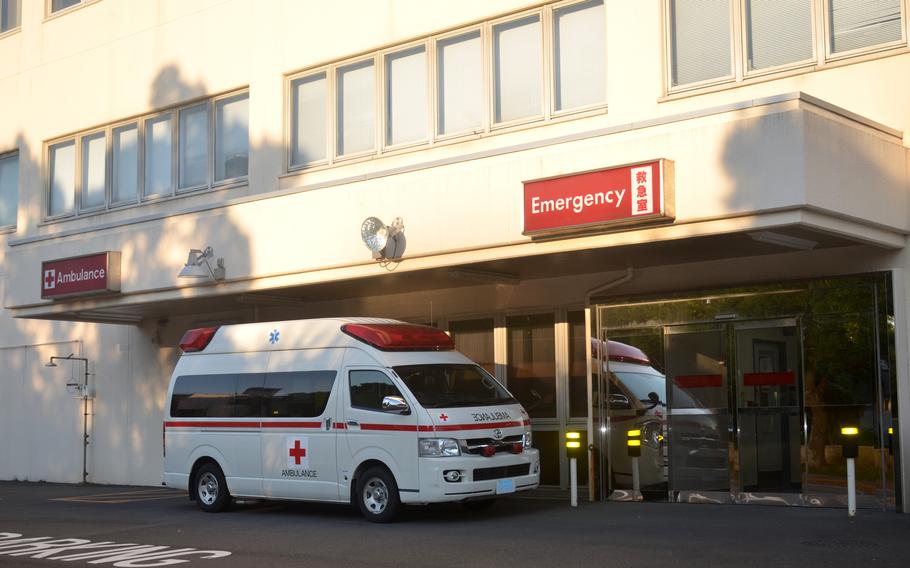
Active-duty service members and Defense Department civilians alike are facing issues with access to health care at Japanese hospitals and at military treatment facilities such as U.S. Naval Hospital Yokosuka, Japan, seen here in 2022. (Alex Wilson/Stars and Stripes)
YOKOSUKA NAVAL BASE, Japan — Japanese hospitals are denying health care for Defense Department civilians and military personnel once every two days, on average, according to a recent report by the Japan Civilian Medical Advocacy group.
More than 340 people were denied access to routine, specialized or emergency care between February 2022 and April 2024, and at least 13 died between 2021 and 2024 due to denials or failure to receive timely medical attention, states a research report released by the group on May 18.
“The state of healthcare for military personnel and civilians in Japan has reached one of its lowest points in decades,” Randi Wilson, a spokeswoman for the group, told Stars and Stripes by Messenger on Tuesday.
The advocacy group, a grassroots organization that began as an online forum for DOD employees to share tips on accessing health care, cites 140 sources in its research. Those include surveys, testimonies and personal correspondence gathered by the group, media coverage and reports from the DOD and U.S. Government Accountability Office.
Japanese hospitals are not required by law to accept patients for care and routinely deny patients at their discretion. Reasons for denials can vary but often pertain to a preference for Japan’s national insurance plan or the belief that they lack adequate resources to treat a patient.
“Currently, no one – whether active duty, retiree, civilian employee, or contractor – is guaranteed medical care for themselves or their loved ones during emergencies,” Wilson said.
Defense Department employees have struggled to receive care at U.S. military hospitals and clinics in Japan and at local hospitals since the Defense Health Agency began implementing changes in February 2022.
The changes were a bid to prioritize health care for active-duty patients on overseas military bases and reduce wait times.
That plan, which significantly reduced access to health care for DOD civilians, has “done nothing to alleviate this crisis” and has potentially made the situation worse, according to Wilson.
“Instead, these measures backfired, causing civilian healthcare providers to resign and military members to leave their contracts, further reducing access,” she said.
Wait times at Yokota Air Base in Tokyo, for example, have not “significantly changed” over the past three years, according to the report.
Services responsible for areas such as ship repair, education, health care, and others also reported a 20% to 80% drop in employment applications due to concerns over accessing medical care.
DHA spokesman Peter Graves acknowledged Stars and Stripes’ request for comment on the report in a Thursday email but was unable to immediately provide a response.
DHA rolled back some restrictions in 2023, and civilians can now seek care for acute or chronic conditions on a space available basis.
However, accessing that care can be difficult.
“A lack of codified policies and protections for DOD civilians allows leaders of [military treatment facilities] to independently set rules, often with no public transparency, causing available care to vary drastically between MTFs,” the advocacy group’s report reads.
Some bases offer only same-day, space-available appointments, while others offer limited appointments up to three days in advance. The range of services also varies, with some bases allowing civilian access to OB-GYN care and others prohibiting it, according to the report.
In early 2023, Gilbert Cisneros Jr., undersecretary of defense for personnel and readiness, and Seileen Mullen, at the time the acting assistant secretary of defense for health affairs, along with Army Maj. Gen. Joseph Heck, the DHA Indo-Pacific director at the time, held a series of town hall meetings on these topics at U.S. bases in Japan.
To sometimes raucous crowds of civilian employees and their families, the three promised to establish working groups with the DOD to address those complaints, but Wilson said there’s been no follow-up or communication on the matter.
The advocacy group is proposing a variety of short- and long-term solutions, including temporarily rescinding space available restrictions, funding translation services, and communication, billing and administration reform.
“What we need now - what we have always needed in the Pacific - is timely access to quality preventive and emergency care,” she said.